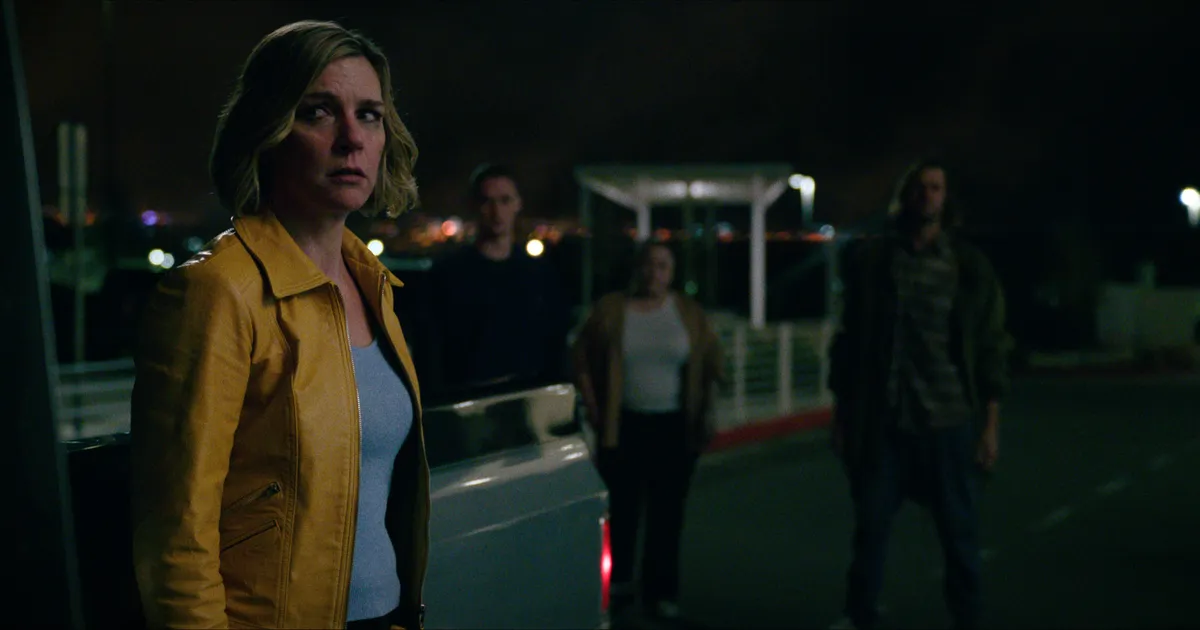Copyright Vulture

In the 1988 John Carpenter classic They Live, aliens have invaded the country without anyone knowing it — or, at least, without anyone of actual power and importance knowing. Then one day, a drifter in Los Angeles, played by the wrestler Roddy Piper, picks up a stray pair of sunglasses, puts them on, and sees the world as it truly is. Through the glasses, the skull-faced alien population reveals itself to have taken over the social elite, whose quest for world domination is aided by subliminal advertising messages aimed at population control. Look up at all those colorful billboards in the city and their true messages are spelled out in bold type: “OBEY,” CONFORM,” “CONSUME,” “REPRODUCE,” “STAY ASLEEP.” Unlike other alien invasion scenarios, the strategy here is not to attack humans with ray guns, but to placate them en masse. To make them happy so they don’t ask questions. Those billboards from They Live come to mind late in the terrific premiere episode of Pluribus, when Carol Sturka (Rhea Seehorn), the author of a bestselling speculative historical romance series, has found her way home after surviving what she understands as an alien invasion. (She’s soon informed, rather pedantically, that it’s not, but that’s a matter for debate.) As she speaks, a representative of this new collective being, who looks official behind a White House lectern on TV, two chyrons appear to her in bold type: YOUR LIFE IS YOUR OWN and WE’RE NOT ALIENS. Surely creator Vince Gilligan is a Carpenter fan, because “YOUR LIFE IS YOUR OWN” feels like a clever little twist on They Live. The difference between that film and Pluribus is that this bold-type message is not as baldly oppressive or insidious. It is instead gentle and palliative. Like, “Yes, it looks like Invasion of the Body Snatchers out there, but we’re not forcing you into anything.” The question hanging over Pluribus, which Carol phrases so elegantly (“I guess to start with, ‘What the fuck is happening?’”), is wisely deferred to preserve this puzzle box of a show, most likely for a long time. If we know anything about Gilligan, especially the storytelling style he embraced in Better Call Saul, it’s that patience and planning are virtues, and that it’s enough to keep viewers on a slow, steady IV drip of information. The seemingly mundane business of over-billing at retirement homes spanned six full seasons on Better Call Saul, so it stands to reason that this extraterrestrial mystery will be parceled out accordingly. The exciting part of the premiere is that it hits us with a grand-scale alien apocalypse while telling us tantalizingly little about what it all means. It starts with excitable nerds. An opening shot of the night sky cranes down to a bank of satellites that immediately recalls Contact, the Robert Zemeckis sci-fi thriller that also starts with scientists trying to parse a message from a distant star system. Here, astronomers are gawking at a radio signal that appears crudely on the screen like a crooked game of Pong, but turns out to be a line of data repeated every 78 seconds from 600 light-years away. Once the ever-expanding group of scientists discovers the signal is more sophisticated than “hello,” the mission changes with breathtaking efficiency: In the space of a cut, the show whisks us from poindexters working behind computer monitors in trailers to a full-scale government lab with high-tech equipment and rat testing. The passing of time is marked intriguingly through on-screen countdowns: We can see that there’s just over a year between when the show opens (439d 19h 56d 08s) and when scientists are working to decode the signal in a lab (71d 13h 21m 02s), but the show mashes the accelerator. One night in a typical testing session, two scientists discover that one of the rats appears to have died, but on closer inspection, its heartbeat is strikingly robust. When the rat bites through one worker’s glove, the spread of the virus begins apace, transmitted via saliva. The initial encounters with these now-zombified humans have a horror-movie creepiness to them, as they pass along the virus with a mirthless smile and a kiss. But it isn’t long before the connectedness between these beings leads to a more efficient, syncopated operation: The clacking of mouth-swab petrie dishes as they’re loaded into boxes for shipping, the line-by-line licking of complimentary donuts at the front desk. Yet much of Pluribus is given over to Carol’s narrow perspective as she experiences the invasion from the ground level. While Carol doesn’t have that much in common with Kim Wexler on Better Call Saul, Seehorn’s lacerating wit is a defining feature for both, and gives this show a refreshing comic edge from the start. When we first meet Carol, she’s reading a lusty passage from Bloodsong of Wycaro, which we’re told is the fourth book in a trilogy that’s made her a prisoner of her own success. As she and her manager/partner Helen (Miriam Shor) leave a gaggle of excited fans at a Dallas Barnes & Noble, their driver wonders if he should know who Carol is. She responds, “Depends. Are you a big fan of mindless crap?” Carol’s cynical, mercenary nature will come into play later when she rebukes these seemingly benevolent invaders, but she possesses a hidden integrity, too. There seems to be a gifted author lurking beneath the sellout who’s writing about purple sand and hunky space pirates. And beyond that, her contempt for the half-literate readers who devour her books speaks to an underlying resistance to conformity — she may make money from the masses, but it galls her to think she has anything in common with them. From the moment outside a tacky modern “saloon” where she loses Helen to this viral takeover — an actual death in Helen’s case, not a transformation — the show (and Seehorn) is expert at depicting her confusion, trauma, and fury at what’s happening to her and to Albuquerque and to the world she cannot yet see. So when this collective alien conscience tries to mollify her, she’s not having it. The fun twist of Pluribus is that, unlike other Body Snatchers scenarios, where infected people point and hiss, the body-snatched are a sunny chorus of accommodation. “We just want to help, Carol!” they all say in unison outside a hospital. And when she’s back home and can’t find the keys to get in the house? They have the omniscience to tell her exactly where she tucked a spare set years earlier — which doesn’t exactly limit the creep factor — and they vacate the cul-de-sac to give her the space she needs to mourn Helen and consider her options. A man on TV named Davis Taffler, the now-former Under Secretary of Agriculture for Farm Production and Conservation, wants her to know that she’s one of only 11 people in the world who seem immune to alien conversion. Yet for Carol, it’s a natural immunity, too. She doesn’t want to be like the dim meatsacks who buy her books. And she certainly doesn’t want to accept the assurances of an extraterrestrial force that’s responsible for Helen’s death. Her instincts tell her that “YOUR LIFE IS YOUR OWN” is a lie, but for now, she will insist on making it true on her terms. Mizzenmasts • Lots of juicy prose in Carol’s book reading, but this simple line may be my favorite: “Later, at four bells, Lucasia stood by the mizzenmast.” • A true Misery scenario when a fan tells Carol, “If Raban doesn’t come back, I’m done.” That Carol has not yet summoned the will to defy her fans and break out of this creative prison is key to understanding her state of mind when the show opens. • The streak of snack machines never working on television shows remains unbroken. If you ever find yourself on TV, don’t bother trying. That bag of Fritos is getting stuck. • Wonderful character moment for Carol to signal Helen to rearrange the books at the airplane convenience store to give a more favorable sightline to Bloodsong of Wycaro. (A book that looks as big as Infinite Jest yet probably takes 1/100th of the time to read.) • Carol on a typical online fan: “I think HoustonMom would spread her legs for a grilled cheese sandwich.” • One detail worth noting: After explaining to Carol that “we’re all one,” Davis Taffler confesses to not knowing exactly how that works. So there’s some detachment from the alien source here. • Hilarious explanation for why Carol is talking to the Under Secretary of Agriculture for Farm Production and Conservation: “Davis Taffler happened to be nearby and intact. And he was wearing a suit.”



